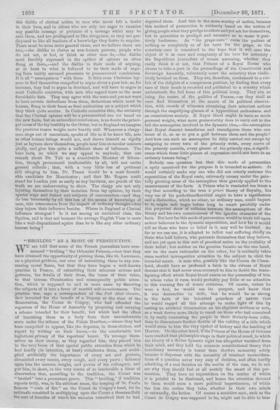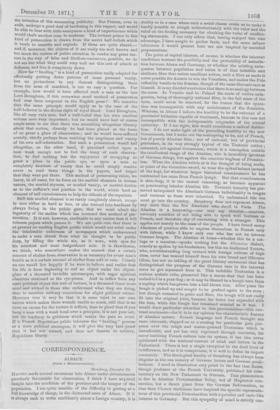" BROILING- " AS A MODE OF PERSECUTION.
WE are told that some of the French journalists have com- menced " broiling" the Orleanist Princes,—not that they have obtained the opportunity of putting them, like St. Lawrence, on a physical gridiron, nor even of submitting them to any con- suming moral flame, but that they have begun a well-known practice in France, of submitting their minutest actions and gestures, the details of their dress, the tones of their voice, to that intense illumination and consequently public atten- tion, which is supposed to end in most cases by throwing the subjects of it into a fever of morbid self-consciousness. The practice was, says a correspondent of the Pall Mall Gazette, first invented for the benefit of a Deputy at the time of the Restoration, the Count de Coigny, who had offended the reporters of the House of Assembly by proposing and carrying a scheme intended for their benefit, but which had the effect of banishing them as a body from their uncomfortable seats under the tribune of the Palais Bourbon,—where they had been compelled to appear, like the deputies, in dress-clothes, and report by writing on their knees,—to the comfortable but inglorious privacy of the reporters' boxes. To revenge them- selves on their enemy, as they regarded him, they placed him in the very focus of that special public attention from which he bad kindly (in intention, at least) withdrawn them, and multi- plied artificially the importance of every act and gesture, chronicled every sneeze, every cough, and every yawn ; fathered upon him the sneezes, coughs, and yawns of his colleagues, and put him, in short, in the very centre of so intolerable a blaze of observation that, according to the tradition, the Count was " broiled" into a premature grave. This "broiling," if tradition reports truly, was, in the strictest sense, the heaping of St. Paul's famous "coals of fire" on the Count de Coigny's head, for its rationale consisted in multiplying upon the Count a thousandfold the sort of benefits of which his enemies conceived that he had deprived them. And this is the more worthy of notice, because this method of persecution is evidently based on the notion of giving people what they grudge to others and yet ask for themselves, but in quantities so prodigal and excessive as to make it posi- tively loathsome. As "the grape-cure" cures the patient of nothing so completely as of his taste for the grape, so the notoriety-cure is conceived in the hope that it will cure the object of it at once and completely of his love for notoriety ; the Republican journalists of course assuming, whether they really think it or not, that Princes of a Royal House who choose to take a part in the proceedings of the Constituent and Sovereign Assembly, voluntarily court the notoriety thus vindic - tively lavished on them. They are, therefore, condemned to a sur- feit of the delights of a conspicuous position, by finding that every turn of their heads is recorded and published to a country which understands the full force of this political irony. They aim at being the centre of the politics of France,—so they shall at once find themselves at the centre of its political observa- tion, with crowds of witnesses examining their minutest actions through the magnifying-glasses of a hypocritical enthusiasm and an ostentatious anxiety. If Royal blood ought to have so much personal weight, what more praiseworthy than to carry out to the full the assumption involved in the dynastic idea,—the assumption that Royal descent transforms and transfigures those who can boast of it, so as to put a gulf between them and the people ? And how can such au assumption be fully carried out except by assigning to every turn of the princely wrist, every curve of the princely nostrils, every glance of the princely eye, a signifi- cance which these little phases of expression could not have in an ordinary human being ?
Nobody can question but that this mode of persecution is aptly conceived for the purpose it is intended to achieve. It would certainly make any one who did not utterly embrace the superstition of the Royal caste, extremely uneasy under the pain- fully growing sense of the assumption thus gravely applied to the measurement of the facts. A Prince who is reminded ten times a day that according to the true is priori theory of Royalty, his very use of his pockethandkerchief ought to have a significance and a distinction, which no other, no ordinary man, could impart to it, might well begin before long to smart painfully under this perpetual show of collision between the assumptions of the theory and his own consciousness of the ignoble character of the facts. But how far this mode of persecution would in truth tell upon ardent believers in the dynastic superstition, and how far it would tell on those who have no belief in it, may well be doubted. As far as we can see, it is adapted to inflict real suffering chiefly on those who half believe, who persuade themselves that they believe, and are yet open to this sort of practical satire on the credulity of their belief ; but neither on the genuine fanatic on the one hand, nor on the mere rationalist on the other, for it evidently takes some morbid introspective attention to the subject to elicit the intended smart. A man who, possibly like the Comte de Cham- bord, should have so profound a faith in the virtues of Royal descent that it had never even occurred to him to doubt the trans- figuring effect which Royal blood exerts on the personality of him in whose veins it runs, would probably pay little or no attention to this running fire of ironic criticism. Of course, unless he were a fool, he would see its purport, and know that it was destructive in drift, but he would be so strong in the faith of his inherited grandeur of nature that he would regard all this attempt to make light of him by casting an artificial illumination on his slightest motions or acts, as a weak device more likely to recoil on those who had conceived it, by really interesting the people in their divinely-horn ruler, than to disseminate further doubts of the validity of a title which would seem to him the very upshot of history and the teaching of lleaven. On the other baud, if the Princes of the House of Orleans have reached that philosophic stage in their political creed, in which the theory of a divine dynastic right has altogether vanished from their mind, and they hold the common constitutional theory that hereditary monarchy is better than elective monarchy solely because it dispenses with the necessity of constant reconsidera- tions of a question never very easy of decision, and often hardly admitting of a real decision on the merits of the case, we do not see why they should feel at all acutely the smart of this per- secution. They have no superstition on the matter of which it is painful to be disabused, and hence the attention devoted to them would seem a mere political impertinence, of which the less the notice they take, whether in their own minds or outwardly, the better. Of course a sensitive man, such as the Count de Coigny was supposed to be, might not be able to bear
the irritation of this unmeaning publicity. But Princes, even in exile, undergo a good deal of hardening in this respect, and would be able to bear with little annoyance a kind of impertinence which would chafe another man to madness. The irritant poison in this kind of persecution is drawn from the secret half-beliefs which it tends to unsettle and explode. If these are quite absent,— and,if, moreover, the objects of it are really too well known and too much the centres of public attention to render any great suc- cess in the way of false and libellous caricature, possible, we do not see but what they could very well set this sort of attack at defiance, and live it completely down.
How far " broiling" is a kind of persecution really adapted for effectually putting down persons of some personal vanity, but no pretentious to any descent distinguishing them from the mass of mankind, is not so easy a question. For example, how would it have affected such a man as the late Lord Brougham, if this somewhat cruel method of persecution had ever been congenial to the English press ? We conceive that the same principle would apply as in the case of the half-believer in the divine right of royal blood. Lord Brougham, like all very vain men, had a half-belief that his own smallest actions were very important ; but he would have had of course ample sense to see that there was something altogether illusory about that notion, directly ho had been placed at the focus of so great a glare of observation ; and he would have suffered acutely, chiefly perhaps from realizing the emptiness and vanity of his own self-admiration. But such a persecution would fail altogether, on the other hand, if practised either upon a man weak enough not to feel the irony of such observa- tion, to feel nothing but the enjoyment of occupying so great a place in the public eye, or upon a man so completely destitute of vanity that he could simply resolve never to read these things in the papers, and forget that they were put there. This method of persecuting relies, we fancy, in all cases, for its force on the morbid elements in human nature, the morbid shyness, or morbid vanity, or morbid doubts as to the sufferer's real position in the world, which lend an element of self-consciousness to help the ridicule of the reporters.
Still this morbid element is so rarely completely absent, except in men either as hard as iron, or else trained into hardness by always living in the public gaze, that we must admit the ingenuity of the malice which has invented this method of per- secution. It is not, however, creditable to any nation that it wilt tolerate papers which pursue it. We are quite sure that there is at present no reading Eaglish public which would not rebel under the intolerable unfairness of newspapers which endeavoured to make a man shrink from what he thought to be public duty, by filling the whole air, as it were, with eyes for his minutest and most insignificant acts. It is Hawthorne, we think, who somewhere makes the remark that a certain amount of shelter from observation is as necessary for every man's health as is a certain amount of shelter from cold or rain. Clearly no one would live happily if he were to believe and realize that his life is from beginning to end an object under the object glass of a thousand invisible microscopes, with eager spiritual observers stationed at the eye-pieces. And to inflict from any mere political object this sort of torture, is a thousand times more cruel and wicked in those who understand what they are doing, than to sanction military executions for slight political crimes. However true it may be that it is some taint in our own nature which makes these wounds rankle so much, still that is no more an excuse for the torture it inflicts, than to plead that if you hang a man with a weak head over a precipice, it is not your act, but his tendency to giddiness which makes the pain so cruel. If a French Republican public tolerates the " broiling " process as a mere political stratagem, it will give the very best proof that it has not earned, and does not deserve to achieve, Republican liberty.



































 Previous page
Previous page